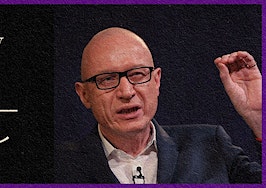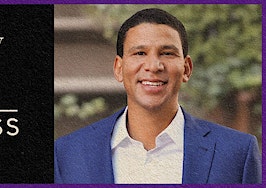Fathom Holdings, parent of cloud-based brokerage Fathom Realty, announced Wednesday that the company experienced a $2.1 million net loss in the second quarter, but revenue jumped 118 percent year-over-year, while its agent count rose 53 percent and completed transactions rose 74 percent.
In total, the company pulled in $84.2 million between April and June, according to the company’s earnings report. That’s up from $38.7 million during the same period in 2020 and considerably higher than the $49.6 million the company earned in first-quarter 2021.
Fathom went public in July 2020 and has made a number of acquisitions since its IPO, including three in the second quarter: Idaho-based real estate brokerage Epic Realty, market data and technology platform LiveBy, and E4:9 Holdings and its three mortgage, insurance and lead generation subsidiaries Encompass Lending Group, Dagley Insurance Agency, and Real Results.
The company also owns intelliAgent, its proprietary cloud-based software, Verus Title and marketing and technology platform Naberly Solutions.
Fathom operates on a fee-based model where agents pay $450 per transaction for the first 12 transactions in a year. After that, agents pay a fee of just $99 per transaction and a yearly $500 transaction fee.
“Quarter after quarter, our results continue to demonstrate the power of our truly disruptive business model,” said Fathom CEO Joshua Harley in a statement.
“It is important to note the incredible runway for future growth that we have as a result of our very recent entry into additional vertical business lines,” he added. “We’re just getting started. One of the best parts of our story is that we now fully own mortgage, title, insurance, lead generation and lead nurturing businesses, as well as two technology businesses, all helping us attract more home buyers and sellers, which in turn also helps us attract more agents, one of the key pillars in our growth strategy.”
In an earnings call with investors Wednesday, Harley said he believed “we can actually grow our company 5x over the next five years,” in part by growing attach rates for Fathom’s newly acquired businesses.
The vast majority of Fathom’s overall second-quarter revenue was real estate brokerage revenue, which includes real estate brokerage services, and came in at $80.2 million in Q2, up from $38.7 million in second-quarter 2020.
The company’s mortgage revenue, which includes its residential loan origination and underwriting services, brought in the second-highest amount of revenue, landing at $1.5 million in the second quarter, up from zero in Q2 2020.
Fathom’s technology revenue, which includes SaaS solutions and data mining for third-party customers, came in at $530,000 for the second quarter, also up from zero during the same period a year ago.
Additionally, Fathom closed 10,100 transactions during the second quarter, up 74 percent year-over-year, and grew its agent network to 6,950 agents, up from 4,554 agents one year ago, the report said.
The company ultimately saw a net loss during the second three months of 2021 of $2.1 million. By contrast, Fathom saw a $161,000 profit in Q2 2020. In the first quarter, the company also had a net loss, of $3.4 million.
Analysts had expected Fathom to bring in $67.67 million in revenue during the quarter, so the company handily beat that forecast, but analysts also expected the company to post a smaller net loss of $0.12 per share. The company instead posted a loss of $0.15 per share.
Fathom attributed Q2’s net loss mainly to “strategic investments in future growth related to enhancing operations, marketing and [general and administrative]” expenses, the last of which the company said was “principally related to acquisitions, public company costs and continued investments in growth.”
Harley said profitability was Fathom’s No. 1 priority.
“Although many companies sacrifice profitability for growth, I believe we can achieve both through our proprietary technology platform, streamlined operations and great value proposition for agents,” he said.
“Our ability to attract an ever-increasing number of real estate agents by providing them with greater income potential, and the robust technology, training, and support they need to grow their businesses, is even more important during these unprecedented times. We look to the future with enthusiasm, optimism and excitement as we continue to quickly take market share from the old-school real estate companies with outdated commission models.”
Fathom had cash and cash equivalents of $12.8 million on June 30, down from $28.6 million on December 31 — a decrease the company attributed mainly to acquisitions.
“With several strategic acquisitions now completed, we are focused on building our cash position through operational cash flow generation,” said Fathom President and CFO Marco Fregenal in a statement.
According to Harley, the “headwinds” that the real estate industry may soon face may prove to be “tailwinds” for Fathom’s growth due to Fathom’s business model.
“As a result of our technology platform and streamlined operations, we’re able to charge our agents a fraction of what other brokerages charge their agents, putting more money into agents’ pockets to help them reinvest in and grow their businesses,” he said. “This is exciting important because it allows us to grow our agent base and transactions quickly and organically.”
Fathom’s agent attrition rate fell to 1.37 percent in the second quarter, down from 1.7 percent in the previous quarter, according to Harley. More than 75 percent of the agents who leave are those who closed less than one transaction per year, while only 2.5 percent of agents who leave close 10 sales per year, he added.
In the second quarter, Fathom also launched a Hispanic division to serve the growing Hispanic homebuyer market.
“We believe that the Spanish-speaking community is still rarely talked about in the real estate space, and it’s our desire to fill that void,” Harley said. “Our industry needs to evolve in new and creative ways to remove barriers and meet the growing needs and demands of Hispanic homebuyers.”
Harley noted during the call that his own family owns more than 50 percent of Fathom’s stock.
Editor’s note: This story has been updated with additional information from Fathom’s earnings report and earnings call.













